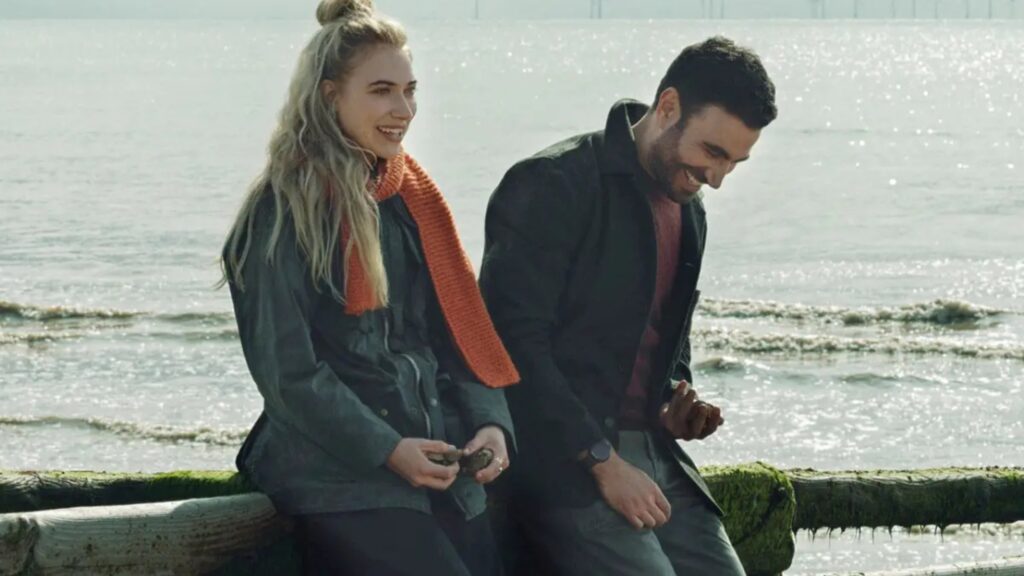Quick Facts & Context
Title: All of You — a science-fiction-tinged romance/drama directed by William Bridges.
Writers: William Bridges & Brett Goldstein.
Runtime: Approximately 98 minutes.
Country: USA (English language) with international festival showings.
Release: World premiere at the Toronto International Film Festival (Sept 2024). Then limited U.S. theatrical/streaming release September 26, 2025 via Apple TV+.
Genre / tone: A romantic-drama with a speculative or near-futuristic twist (the “soulmate test” element) — it uses a somewhat science-fictional device to explore love, fate, friendship and regret.
Cast & the “Means Character”.
Key Cast
Some of the principal cast members:
- Brett Goldstein as Simon (the male lead).
- Imogen Poots as Laura (the female lead).
- Zawe Ashton as Andrea (a supporting role).
- Steven Cree as Lukas (Laura’s matched partner).
- Jenna Coleman as Robyn (another supporting character).
From the full cast lists, there are a considerable number of additional supporting actors (receptionists, friends, minor characters) — IMDb lists many names. But narratively the story centers on the above main four or five characters, maybe supplemented by a handful more.
The “Means Character” – Who we follow.
In most narratives, the “means character” is the one through whose perspective the story unfolds — their choices carry the emotional and thematic weight. In All of You, the viewpoint and emotional arc centre most heavily on Simon (Brett Goldstein) and Laura (Imogen Poots) — both drive the story. However, if I must pick one, I’d identify Simon as the primary “means character,” because his inner world — his unspoken love for Laura, his hesitation, his life choices — is the underpinning tension of the film. Laura is essentially the co-lead and her decisions are equally important; but the audience often watches her via Simon’s longing and perspective.
Box Office / Release & Performance.
- Because this is an independent/limited release film (and streaming via Apple TV+), box office numbers are not widely reported in the way major studio blockbusters are. I found no reliable wide-theatrical grosses listed publicly (e.g., BoxOfficeMojo or TheNumbers don’t list major totals).
- The film premiered at TIFF Sept 2024 and was acquired by Apple TV+ for distribution.
- Release date of limited theaters + streaming: September 26, 2025.
- Because of this distribution approach (limited theatrical + streaming), the “box collection” (theatrical revenue) likely is modest and not publicly charted in detail. The key measure for such a film would be streaming uptake, critical reception, and awards / festival prestige, rather than blockbuster box office.
- Critical reception: Metacritic score ~66 (“generally favourable”) based on 14 critic reviews.
- Rotten Tomatoes: ~77% Tomatometer (35 reviews) for All of You.
So: the film did not (as far as available data) become a big box-office juggernaut; it is more of an indie romantic drama with streaming platform backing.
Niche & Thematic Domain.
What kind of movie is this, and what does it try to do?
- Genre wise: it sits at the intersection of romantic drama and minimal speculative fiction. The speculative element arises through the “soulmate test” — a futuristic device that claims to scientifically determine your one true match. That piece of tech adds a twist, but the film is not a heavy sci-fi spectacle; it uses this device as a framing mechanism for the emotional drama.
- Tone: The film is reflective, slow-burning, emotionally introspective. It is about missed opportunities, long-held feelings, the complexity of love and friendship, and the question of “what if”.
- Niche: It appeals to audiences who like relationship films with a twist, who are comfortable with unresolved or bittersweet endings, and who enjoy character-driven narratives rather than high-action. It also touches on themes of technology and fate (the “destination soulmate” test) which gives it a slight speculative flavour, so it may attract viewers who like a romance with a little speculative edge (though the emphasis is on emotion, not gadgetry).
- Thematic concerns include: the tension between fate and choice; the question of whether friendship can or should evolve into romance; how past unspoken feelings linger; what it means to accept the paths life gives you vs fighting for what you believe you deserved.
- Mood wise: both hopeful and melancholic. The film doesn’t necessarily promise a fairy-tale finish; it leans more into the realism of compromise, of timing, of the costs of love.

Deep Narrative & Analysis.
Here’s a more detailed look at the story, how it unfolds, the structural beats, and what works/what doesn’t.
Story setup
Simon and Laura have been best friends since college. The film opens (or early scenes show) their deep friendship and the sense that Simon harbors feelings for Laura beyond friendship, though nothing has been voiced. Laura wants more certainty in life, more meaning; Simon is more reserved, attached to the stability of friendship.
The speculative hook: Laura takes a “soulmate test” (offered by a company called something like “Soul Connex”) that claims to scientifically assign your one true match. Simon pays for the test for Laura (or supports it), partly out of care. When the result comes back, Laura is matched with someone else — Lukas — not Simon. This shatters the unsaid tension between Simon and Laura.
Diverging paths & emotional build
From that moment, the film tracks years of Laura’s marriage or relationship with Lukas, Laura becoming a parent, her life moving in one direction, while Simon remains somewhat static (or makes his own life choices, but the emotional core remains tied to Laura). Throughout the film, their paths cross, diverge, reconnect. There’s temptation, longing, regret. Laura and Simon share moments of intensity and connection, yet the barriers (marriage, social expectations, fear of risk) persist.
Simon’s internal journey: He must grapple with unrequited love (or love that he never fully declared), with the question of whether he should wait or move on; with the idea that maybe the “test” result means nothing. Laura’s journey: She must decide whether to suppress what she feels, whether to risk everything for what she suspects, whether she accepts the path laid out by the test or fights it. The love story is complicated by technology/fate (the test) but fundamentally about human choice and regret.
Climax & resolution
The film builds toward a confrontation or a decision: Simon asks Laura to leave her relationship/family and be with him; Laura must choose. Ultimately the resolution is bittersweet and realistic: Laura declines (or chooses differently), Simon recognizes he cannot live on “what-if” alone; both accept that some love stories are defined not by full happiness but by acknowledgement, acceptance, maybe a last weekend together, maybe walking away. The final image: Laura leaving without looking back, Simon not chasing. Their relationship is transformed, but not neatly wrapped up.
What works
- The central performances: Brett Goldstein and Imogen Poots are widely praised for chemistry and emotional authenticity. Rotten Tomatoes reviews highlight their work.
- The film’s concept: The “soulmate test” gives a fresh hook to the familiar “friends who might love each other” trope. It opens up questions about fate vs free will.
- The emotional resonance: The film captures the ache of “almost” and “if only” — that intangible sense that you missed something. That emotional pulse lingers.
- Directing and tone: William Bridges (in his feature debut) uses the speculative element lightly, focusing on characters rather than tech. This helps keep the story grounded even as it contains a “what if” concept.
What doesn’t
- Some critics argue the sci-fi premise is under-used. From one review: the concept “seems to have absolutely no impact on the story whatsoever.”
- Pacing and stakes: Because the film avoids high-action or spectacle, some viewers feel the dramatic stakes are low; the shift of time (years passing) sometimes feels abrupt and the narrative meanders.
- Moral ambiguity and character decisions: Some critics note that treating the affair (Laura & Simon) and the hurt caused to others in a somewhat ambiguous way leaves the viewer uncomfortable or unsatisfied. (See user reviews on IMDb: many felt the protagonists were selfish and the film glossed over consequences.)
Why it matters & who should watch it.
All of You matters because it’s a reminder that romance in film doesn’t always have to be about perfect endings. It acknowledges that love can be messy, timing can be off, friendships can harbour unspoken feelings, and technology may claim to answer what the heart never fully can. For fans of relationship films, for those who like contemplative cinema, this is a film that offers something deeper than standard rom-com fare.
If you’re drawn to films like Before Sunrise, When Harry Met Sally, Her, Past Lives — movies that explore connection, longing, identity, and the steps we didn’t take — this film aligns well. It won’t satisfy if you want a traditional happily-ever-after or grand spectacle.
In the streaming era, this kind of film also proves there’s still room for small-scale, character-driven stories with a twist: they don’t need billion-dollar budgets, they live on emotional truth rather than CGI.
Final Thoughts.
All of You aims high with a quietly bold concept (a soulmate algorithm) and delivers a story that is intimate, imperfect, and emotionally raw. It doesn’t pretend to answer big questions about destiny vs choice — instead, it lives in the grey area. Its success lies in its performances and its tone: a subdued heartbreak, a longing unfulfilled, a friendship turned deeper but undercut by timing.
Though its theatrical box-office may be modest (given its limited release and streaming model), the film’s value lies in its emotional texture and thematic resonance. It may not be for everyone—its ambiguity and slow pace will frustrate some—but for those willing to embrace a bittersweet romance rooted in realism and what-ifs, All of You is a worthwhile journey.
If you like, I can pull together a scene-by-scene breakdown of All of You (with some spoilers) or compare it to three similar films (with what each does differently) for reference. Would you like that?





